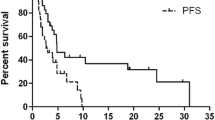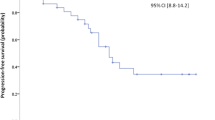Abstract
Background
The number of studies evaluating the efficacy and safety of third-line molecular-targeted therapy for metastatic renal cell carcinoma (mRCC) is limited.
Methods
The data for 48 patients with disease progression after first-line vascular endothelial growth factor receptor tyrosine kinase inhibitor (TKI) and second-line targeted therapy were evaluated. Patients with prior cytokine therapy were excluded. Overall survival (OS) after first- and second-line therapy initiation was compared between patients with and without third-line therapy. In addition, dose-limiting toxicities (DLTs) were evaluated.
Results
Twenty-two of 48 patients (45.8%) received third-line therapy, and TKI and mammalian target of rapamycin inhibitor were each administered in 11 patients (50%). Patients with third-line therapy had significantly longer median OS after first-line therapy (26.6 vs. 14.6 months, p = 0.0010) and second-line therapy (18.2 vs. 7.4 months, p < 0.0001) compared to those without third-line therapy. Multivariate analysis showed that the use of third-line therapy following second-line therapy was an independent prognosticator for longer OS (hazard ratio 0.29, 95% confidence interval 0.14–0.58, p = 0.0005). The median progression-free survival and OS after third-line therapy was 2.76 and 8.71 months, respectively. Although a high frequency of DLTs was observed (n = 10, 45.5%), the frequencies were similar among the sequential therapies.
Conclusions
Third-line therapy has a beneficial therapeutic effect in patients with mRCC that is resistant to previous therapies. However, there is a need to evaluate in detail the high frequency of adverse events, including DLTs.




Similar content being viewed by others
References
Figlin R, Sternberg C, Wood CG (2012) Novel agents and approaches for advanced renal cell carcinoma. J Urol 188:707–715
Motzer RJ, Hutson TE, Tomczak P et al (2007) Sunitinib versus interferon alfa in metastatic renal-cell carcinoma. N Engl J Med 356:115–124
Duran I, Lambea J, Maroto P et al (2017) Resistance to targeted therapies in renal cancer: the importance of changing the mechanism of action. Target Oncol 12:19–35
Seidel C, Busch J, Weikert S et al (2012) Progression free survival of first line vascular endothelial growth factor-targeted therapy is an important prognostic parameter in patients with metastatic renal cell carcinoma. Eur J Cancer (Oxford, England: 1990) 48:1023–1030
Wells JC, Stukalin I, Norton C et al (2017) Third-line targeted therapy in metastatic renal cell carcinoma: results from the International Metastatic Renal Cell Carcinoma Database Consortium. Eur Urol 71:204–209
Ko JJ, Choueiri TK, Rini BI et al (2014) First-, second-, third-line therapy for mRCC: benchmarks for trial design from the IMDC. Br J Cancer 110:1917–1922
Oudard S, Geoffrois L, Guillot A et al (2016) Clinical activity of sunitinib rechallenge in metastatic renal cell carcinoma—results of the REchallenge with SUnitinib in MEtastatic RCC (RESUME) study. Eur J Cancer (Oxford, England: 1990) 62:28–35
Buchler T, Bortlicek Z, Poprach A et al (2014) Efficacy of everolimus in second- and third-line therapy for metastatic renal cell carcinoma: a registry-based analysis. Urol Oncol 32:569–575
Park I, Lee JL, Ahn JH et al (2015) Vascular endothelial growth factor receptor tyrosine kinase inhibitor (VEGFR-TKI) rechallenge for patients with metastatic renal cell carcinoma after treatment failure using both VEGFR-TKI and mTOR inhibitor. Cancer Chemother Pharmacol 75:1025–1035
Busch J, Seidel C, Erber B et al (2013) Retrospective comparison of triple-sequence therapies in metastatic renal cell carcinoma. Eur Urol 64:62–70
Bedke J, Gauler T, Grunwald V et al (2017) Systemic therapy in metastatic renal cell carcinoma. World J Urol 35:179–188
Escudier B, Michaelson MD, Motzer RJ et al (2014) Axitinib versus sorafenib in advanced renal cell carcinoma: subanalyses by prior therapy from a randomised phase III trial. Br J Cancer 110:2821–2828
De Velasco G, Xie W, Donskov F et al (2017) Discontinuing VEGF-targeted therapy for progression versus toxicity affects outcomes of second-line therapies in metastatic renal cell carcinoma. Clin Genitourin Cancer 15(403–410):e402
Ishihara H, Kondo T, Yoshida K et al (2017) Time to progression after first-line tyrosine kinase inhibitor predicts survival in patients with metastatic renal cell carcinoma receiving second-line molecular-targeted therapy. Urol Oncol 35(9):542.e1–542.e9
Ishihara H, Yagisawa T, Kondo T et al (2017) Effect of the timing of best tumor shrinkage on survival of patients with metastatic renal cell carcinoma who received first-line tyrosine kinase inhibitor therapy. Int J Clin Oncol 22:126–135
Motzer RJ, Bacik J, Schwartz LH et al (2004) Prognostic factors for survival in previously treated patients with metastatic renal cell carcinoma. J Clin Oncol 22:454–463
Fernandez-Pello S, Hofmann F, Tahbaz R et al (2017) A systematic review and meta-analysis comparing the effectiveness and adverse effects of different systemic treatments for non-clear cell renal cell carcinoma. Eur Urol 71:426–436
Kroeger N, Xie W, Lee JL et al (2013) Metastatic non-clear cell renal cell carcinoma treated with targeted therapy agents: characterization of survival outcome and application of the International mRCC Database Consortium criteria. Cancer 119:2999–3006
Alimohamed N, Lee JL, Srinivas S et al (2014) A population-based overview of sequences of targeted therapy in metastatic renal cell carcinoma. Clin Genitourin Cancer 12:e127–e131
Geynisman DM, Hu JC, Liu L et al (2015) Treatment patterns and costs for metastatic renal cell carcinoma patients with private insurance in the United States. Clin Genitourin Cancer 13:e93–e100
Motzer RJ, Escudier B, McDermott DF et al (2015) Nivolumab versus everolimus in advanced renal-cell carcinoma. N Engl J Med 373:1803–1813
Acknowledgements
The authors thank Editage for English language editing and Nobuko Hata for secretarial support.
Author information
Authors and Affiliations
Corresponding author
Ethics declarations
Conflict of interest
Tsunenori Kondo received honoraria from Pfizer, Bayer, and Novartis. None of the other authors have any conflicts of interest to declare.
Electronic supplementary material
Below is the link to the electronic supplementary material.
Fig.
S1a–b. Overall survival after first- and second-line therapy according to the use of third-line therapy in 34 patients with a diagnosis of clear-cell carcinoma. Patients with third-line therapy (n = 16) had a significantly longer overall survival after first- and second-line therapy than those without third-line therapy. a Median overall survival after first-line therapy: 30.6 vs. 18.5 months, p = 0.0110. b Median overall survival after second-line therapy: 21.8 vs. 8.34 months, p = 0.0013. (TIFF 138 kb)
Fig.
S2. Waterfall plot analysis. The waterfall plot analysis shows the objective response rate according to the third-line agents used in each patient. mTORi mammalian target of rapamycin inhibitor (TIFF 69 kb)
About this article
Cite this article
Ishihara, H., Takagi, T., Kondo, T. et al. Efficacy and safety of third-line molecular-targeted therapy in metastatic renal cell carcinoma resistant to first-line vascular endothelial growth factor receptor tyrosine kinase inhibitor and second-line therapy. Int J Clin Oncol 23, 559–567 (2018). https://doi.org/10.1007/s10147-018-1241-3
Received:
Accepted:
Published:
Issue Date:
DOI: https://doi.org/10.1007/s10147-018-1241-3




